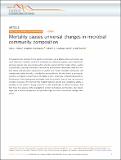| dc.contributor.author | Abreu, Clare Isabel | |
| dc.contributor.author | Andersen Woltz, Vilhelm L. | |
| dc.contributor.author | Gore, Jeff | |
| dc.date.accessioned | 2020-04-14T12:57:52Z | |
| dc.date.available | 2020-04-14T12:57:52Z | |
| dc.date.issued | 2019-05-09 | |
| dc.identifier.issn | 2041-1723 | |
| dc.identifier.uri | https://hdl.handle.net/1721.1/124608 | |
| dc.description.abstract | All organisms are sensitive to the abiotic environment, and a deteriorating environment can cause extinction. However, survival in a multispecies community depends upon interactions, and some species may even be favored by a harsh environment that impairs others, leading to potentially surprising community transitions as environments deteriorate. Here we combine theory and laboratory microcosms to predict how simple microbial communities will change under added mortality, controlled by varying dilution. We find that in a two-species coculture, increasing mortality favors the faster grower, confirming a theoretical prediction. Furthermore, if the slower grower dominates under low mortality, the outcome can reverse as mortality increases. We find that this tradeoff between growth and competitive ability is prevalent at low dilution, causing outcomes to shift dramatically as dilution increases, and that these two-species shifts propagate to simple multispecies communities. Our results argue that a bottom-up approach can provide insight into how communities change under stress. | en_US |
| dc.language.iso | en | |
| dc.publisher | Springer Science and Business Media LLC | en_US |
| dc.relation.isversionof | 10.1038/s41467-019-09925-0 | en_US |
| dc.rights | Creative Commons Attribution 4.0 International license | en_US |
| dc.rights.uri | https://creativecommons.org/licenses/by/4.0/ | en_US |
| dc.source | Nature | en_US |
| dc.subject | General Biochemistry, Genetics and Molecular Biology | en_US |
| dc.subject | General Physics and Astronomy | en_US |
| dc.subject | General Chemistry | en_US |
| dc.title | Mortality causes universal changes in microbial community composition | en_US |
| dc.type | Article | en_US |
| dc.identifier.citation | Abreu, Clare I. et al. "Mortality causes universal changes in microbial community composition." Nature Communications 10 (2019): 2120 © 2019 The Author(s) | en_US |
| dc.contributor.department | Massachusetts Institute of Technology. Department of Physics | en_US |
| dc.relation.journal | Nature Communications | en_US |
| dc.eprint.version | Final published version | en_US |
| dc.type.uri | http://purl.org/eprint/type/JournalArticle | en_US |
| eprint.status | http://purl.org/eprint/status/PeerReviewed | en_US |
| dc.date.updated | 2020-02-06T14:09:11Z | |
| dspace.date.submission | 2020-02-06T14:09:13Z | |
| mit.journal.volume | 10 | en_US |
| mit.journal.issue | 1 | en_US |
| mit.license | PUBLISHER_CC | |
| mit.metadata.status | Complete | |
